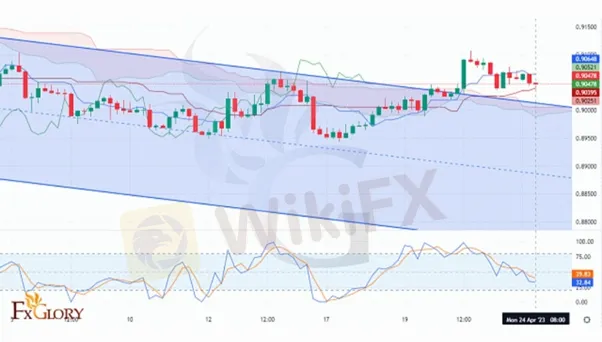AUDCAD analysis for 24.04.2023
Abstract:The AUDCAD price has been following a bearish trajectory within a downward sloping channel for some time.

The AUDCAD price has been following a bearish trajectory within a downward sloping channel for some time. However, recent market movements indicate a possible trend reversal. The price has broken above the bearish channel and the Ichimoku cloud, both of which are significant technical indicators. Additionally, the Stochastic K% and D% lines are moving towards 20, indicating that the price is approaching oversold territory. This pattern is often a precursor to a trend reversal, and traders may interpret it as a signal to enter long positions.
However, it is important to note that technical analysis alone cannot predict future price movements with certainty, and traders should always use risk management strategies to limit potential losses. Additionally, fundamental factors such as global economic conditions and geopolitical events may also impact the price of AUDCAD.
There is a resistance level at 0.90785 followed by resistance at 0.91130 and 0.91350.


Read more

Broker Comparsion: FXTM vs AvaTrade
FXTM and AvaTrade are two well-established online brokers offering forex and CFD trading across global markets. Both enjoy strong reputations and high ratings on WikiFX—FXTM holds an AAA overall rating, while AvaTrade scores 9.49/10, indicating they’re regarded as reliable choices by the community. However, since brokers have great reputation in the industry, how do we know which one is more suitable for individuals to invest in? Today's article is about the comparison between FXTM and AvaTrade.

Shocking Move: Yen Breaks Past 140 Barrier!
The yen's breakout above the 140 mark has caught global attention, and the reasons behind it are more than technical.

FINRA fines SpeedRoute for alleged rule violations
The Financial Industry Regulatory Authority (FINRA) has imposed a $300,000 fine on SpeedRoute LLC for a series of supervisory, risk management, and anti-money laundering (AML) program deficiencies spanning from 2017 to the present. Of this amount, $75,000 is payable to FINRA, with the remainder offset by SpeedRoute’s limited ability to pay. In addition to the monetary penalty, SpeedRoute has been censured and ordered to overhaul its compliance framework, including enhancing its written supervisory procedures (WSPs) for market access controls and strengthening its AML program.

Nigeria's Oil Crisis: How Are Stakeholders Responding?
Despite being rich in oil, Nigeria struggles with refining shortages. What’s behind this paradox, and how are different actors reacting?
WikiFX Broker
Latest News
Love, Investment & Lies: Online Date Turned into a RM103,000 Scam
Broker Took 10% of User's Profits – New Way to Swindle You? Beware!
Pi Network: Scam Allegations Spark Heated Debate
Broker Comparsion: FXTM vs AvaTrade
Account Deleted, Funds Gone: A New Broker Tactic to Beware Of?
Broker’s Promise Turns to Loss – Funds Disappear, No Compensation!
El Salvador and U.S. Launch Cross-Border Crypto Regulatory Sandbox
The Instagram Promise That Stole RM33,000
Coinbase Launches Bitcoin Yield Fund for Institutional Investors
Before You Trade the Next Big Thing, Remember the Dot-Com Collapse
Rate Calc

